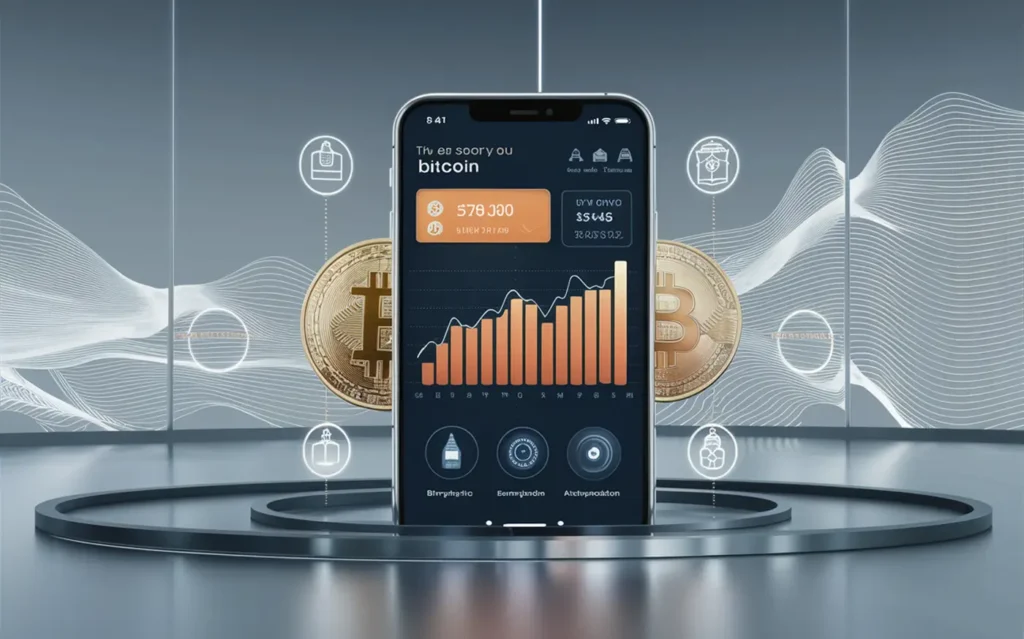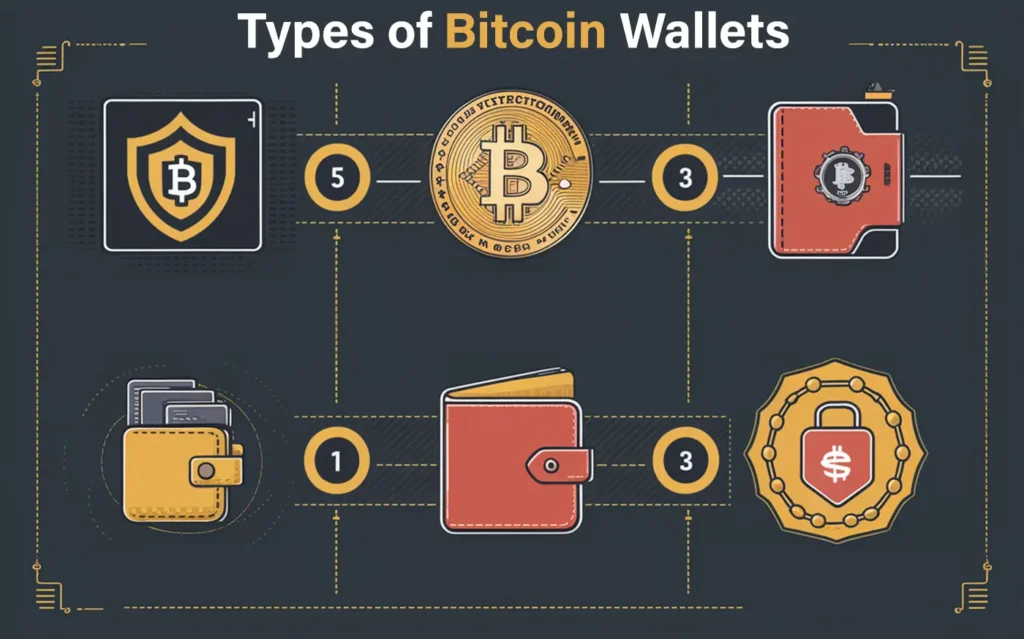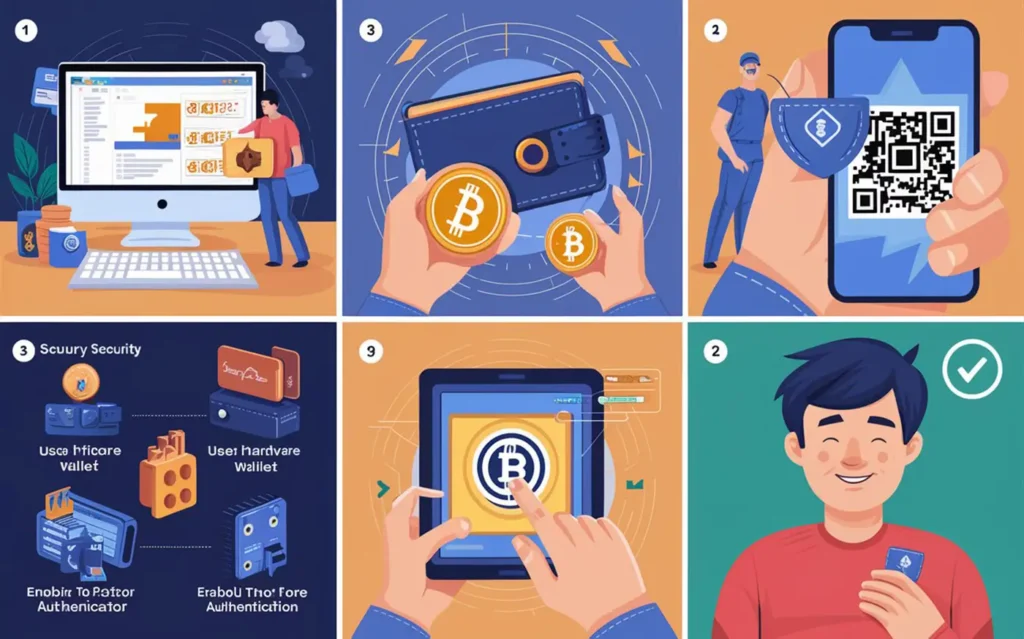Bitcoin, the king of cryptocurrencies, is storming the global financial industry. As new people join this space, they often find themselves stuck due to several complexities, mainly how to store Bitcoin.
The process of buying Bitcoin is pretty straightforward. However, a beginner needs to be extra cautious regarding storage. There is always the risk of losing your Bitcoin by sending it to the wrong wallet address.
You will also have to make a hard choice about the wallet to use, given many providers in the market.
This article dives into the intricacies of storing Bitcoin. We will explain crypto wallets, how to pick one, and how to ensure your Bitcoin is safe.
Understanding Bitcoin Wallets
A Bitcoin wallet is used to send and receive Bitcoins. While the term wallet might mean where you store currency, a Bitcoin wallet operates differently from a physical wallet.
Unlike a physical wallet, where you will store fiat currency, a Bitcoin wallet does not hold Bitcoin. Instead, you should consider it a debit card in your wallet. A debit card gives you access to money, and a Bitcoin wallet lets you access your Bitcoin.
A Bitcoin wallet will store the cryptographic information you need to access Bitcoin addresses and make transactions. The device or app harboring your wallet will not store the coins.
Instead, it will store the private keys. Your coins will exist on the Bitcoin blockchain, while your private key will be used to authorize transactions.
You should note that having a Bitcoin wallet does not mean you cannot store other cryptocurrencies. Instead, some wallets allow you to hold a vast number of assets.
How Do Bitcoin Wallets Work?

The process of sending and receiving Bitcoin relies on cryptographic key pairs. A key pair comprises a public key and a private key. Private keys should be kept private. On the other hand, public keys are readily available to anyone.
A public key is like your bank account number. Anyone can access this number and will not threaten your account’s security. Meanwhile, the private key is like the password to your debit card.
Whenever you create a Bitcoin wallet, a seed phrase will be generated. The phrase entails words you must remember to generate the Bitcoin key needed to send and receive Bitcoin. The seed phrase is like a long password that only you can know.
You should never forget your seed phrase because you can access your Bitcoin with it. Unlike a bank, where you can get assistance when you forget your account password, Bitcoin is not controlled by any entity.
Therefore, losing or forgetting your account will leave you unable to access your Bitcoin.
If someone has your seed phase, they can access your Bitcoin, which explains the need to keep it safe.
It is also important to note that while some Bitcoin wallets are free, you must buy others.
Types of Bitcoin Wallets

There are three main types of wallets you can use to store Bitcoin. These include software wallets, hardware wallets, and paper wallets.
Software Wallets
Software wallets, also known as hot wallets, are the most popular types of Bitcoin wallets and the most readily available. Picking a software wallet can be challenging because of the many choices available.
Software wallets come in three forms: mobile, desktop, and web.
Mobile Wallets
Mobile wallets come in the form of an app on your smartphone. The wallet app will store private keys. The best thing about a mobile wallet is that it stores Bitcoin, pays, and trades crypto with your phone.
While mobile wallets are convenient due to easy access to funds, they are also vulnerable to malware and hacking. Moreover, failing to have two-factor authentication (2FA) might lead to losing your wallet if you lose your phone.
Desktop Wallets
Desktop wallets also store Bitcoin online on your computer’s hard drive. They are ideal for those looking to trade Bitcoin through their computer.
Like mobile wallets, desktop wallets are also prone to phishing attacks, malware, and hacking, making them less ideal for storing a large amount of Bitcoin.
Web Wallets
Web wallets are the least secure because they expose you to the risks of storing Bitcoin online and the risk of control by a third party. Web wallets store private keys on a server, allowing you to access Bitcoin on the go.
Cryptocurrency exchanges operate most web wallets. Over the years, there have been several instances of cryptocurrency exchanges going bankrupt or being hacked, which leaves users counting losses.
Once you buy Bitcoin from a cryptocurrency exchange, it is best that you transfer the coins to an external wallet later, where you will have more control.
Hardware Wallets
A Bitcoin hardware wallet, also known as a cold wallet, is your solution to securing your coin. It is the safest way to store Bitcoin, as you will be free from malware and viruses, and your private keys will be stored on a physical device such as a USB drive.
The most popular examples of hardware wallets are Ledger and Trezor. After buying a hardware wallet, you should keep your USB drive safe, as losing it will mean losing your Bitcoin.
It is also important to note that hardware wallets are not entirely immune from threat actors. Over the years, Ledger users have been the target of phishing campaigns seeking to steal BTC. You should also buy the hardware wallet from the manufacturer. Avoid second-hand hardware wallets.
Paper Wallets
A paper wallet will also store your private keys in a physical document. The document comprises the public address to receive Bitcoin and a private key to access the stored BTC.
Paper wallets come in the form of QR codes that you can scan. Paper wallets store keys offline like hardware wallets, making them less prone to hacking attacks.
However, paper wallets are highly likely to get stolen or spoiled. Therefore, you should store the paper wallet in a sealed bag to avoid wear and tear or water damage. You can also choose to laminate or store in a safety deposit box.
Setting Up Your Bitcoin Wallet

If you are using a software wallet, you must go to the wallet provider’s official website, download the wallet, and follow the on-screen instructions to install it. You should double-check the URL to ensure you are downloading from the official site.
You can also sign up for a cryptocurrency exchange account to set up your web wallet. You can choose to store a small amount of Bitcoin on the exchange. However, it is recommended that you do not leave your Bitcoin to a third party.
To set up a hardware wallet, purchase the wallet from the manufacturer. Every wallet is unique, and you have to follow the instructions provided by the manufacturer to set it up.
How to Secure Your Bitcoin
When you want to store Bitcoin securely, you should take measures and ensure it will be less prone to theft.
The first step to securing your Bitcoin is to pick the right wallet. For example, a hardware wallet is a better alternative than a software wallet if you store a large amount of Bitcoin. Conversely, a software wallet will be suitable if you are a frequent crypto trader.
When setting up your wallet, you should create a strong password to secure it. You should also secure the seed phrase to avoid losing your crypto.
You should also practice best internet practices, such as keeping the wallet software current, enabling two-factor authentication, and being aware of phishing campaigns and scams.
In Summary
The best way to store Bitcoin is in a cryptocurrency wallet. Bitcoin wallets do not hold your Bitcoin. Instead, they have the private keys needed to access Bitcoin.
One can store Bitcoin in a hardware, software, or paper wallet. Hardware and paper wallets are ideal for storing a large amount of Bitcoin or holding it for a long time, as they are not prone to hacking attacks.
Conversely, if you are looking for a convenient way to pay and trade Bitcoin, it is recommended that you store Bitcoin in a software wallet.
When storing Bitcoin, it is recommended that you practice best internet practices such as keeping your wallet updated, securing your seed phrase, setting up two-factor authentication, and being aware of hacking attacks.
FAQs
What is the safest way to store Bitcoin?
The best way to store Bitcoin is in a crypto wallet. A wallet will not store your coins, it will instead store your private keys.
How can I secure my Bitcoin wallet?
You can secure your Bitcoin wallet by setting up a strong password. You should also ensure that your seed phrase remains private. Backing up your wallet also minimizes the chances of losing your private keys.
What is the difference between a hot wallet and a cold wallet?
A hot wallet will store Bitcoin online, while a cold wallet will store Bitcoin offline. Cold wallets are more secure than hot wallets.
What should I do if I lose access to my wallet?
You should safeguard the security of your wallet and seed phrase to avoid losing crypto. If you have up your wallet, regaining access will be easier than when you have yet to back up.










